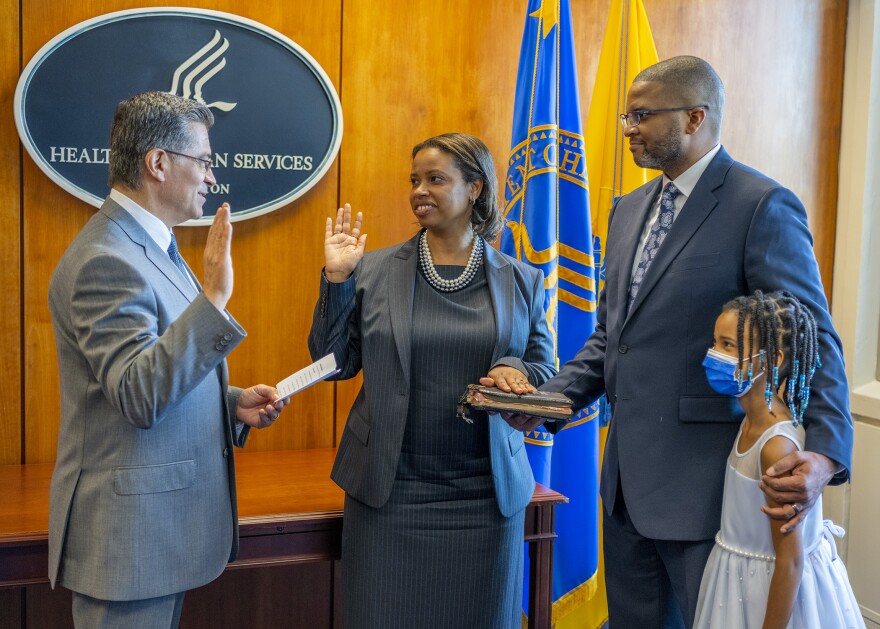Missouri is in line to get close to a billion dollars for expanding Medicaid, which could substantially defray the costs of delivering the health care program to the working poor.
The U.S. Department of Health and Human Services announced on Monday that Missouri will get an estimated $968 million for expanding Medicaid to individuals making no more than roughly $17,800 a year. The move comes more than a year after Missouri voters approved expansion on the statewide ballot and less than a week after the state agency that oversees Medicaid began reviewing applications.
Missouri is getting the funds because of a provision in federal coronavirus relief legislation, known as the American Rescue Plan, which provides money to states that expand Medicaid. Missouri is the 38th state to take advantage of expansion, which was a core provision of the Affordable Care Act.
“Hundreds of thousands of Missourians can now gain the peace of mind of having health coverage through Medicaid,” said Health and Human Services Secretary Xavier Becerra in a statement. “This is a win for all Missourians who have fought long and hard to gain their rightful access to quality health insurance made possible through the Affordable Care Act.”
Getting Medicaid expansion up and running in Missouri was an arduous process. The state made deep eligibility cuts to the program in 2005, and subsequent efforts to reverse course faltered until voters approved a 2020 ballot item over the objections of most Republicans in the legislature. The Missouri Supreme Court ruled this summer that the Medicaid expansion measure was valid, and the state started reviewing applications on Friday.
St. Louis Public Radio’s Jason Rosenbaum spoke with U.S. Centers for Medicare and Medicaid Services Administrator Chaquita Brooks-LaSure on Monday about the impact that expansion could have on Missourians and the state’s budget. (Questions and answers have been edited for clarity and length.)

Jason Rosenbaum: Roughly 17,000 people have signed up for Medicaid since people in the expansion population could start applying in August. What is the federal government going to do to get more eligible people into the program?
Chaquita Brooks-LaSure: We are so excited that Missouri has expanded health care in the state and expanded the Medicaid program. What we’ve seen over the last year is that outreach and education makes a huge difference. And so as part of that, we are encouraging everyone to know the rules have changed. And they should go to covermissouri.org/health to find out if they are eligible for coverage. We are strongly working with the state to continue to help get the word out that people can now enroll in coverage.
Rosenbaum: Missouri is getting $968 million over the next two years from a bill known as the American Rescue Plan for implementing expansion. What could the state spend that money on?
Brooks-LaSure: As part of the plan, states which have expanded coverage get additional funding to cover people. And so, the costs to the state for the expansion are really minimal. So the state can use the federal funding to actually cover people and really encourage people to enroll.
Rosenbaum: The way Medicaid expansion works is that the federal government pays for about 90% of the cost and the state pays the remaining 10%. Could Missouri use the $968 million to pay for the state portion of expansion?
Brooks-LaSure: Yes, in the sense that basically 95% of the costs are covered for Missouri. So the money goes straight to covering the newly eligible individuals, and the state doesn’t have to put up that funding.
Rosenbaum: One of the reasons Medicaid expansion took so long to get across the finish line in Missouri is that Republicans contended it would be a long-term financial burden for the state. What assurances can you provide to Missourians that this is going to be a good deal from a budgetary perspective?
Brooks-LaSure: I would say that what we’ve seen in the last year and a half is the price we pay for not having comprehensive coverage in our country. And it is so important that we remember the work of the Affordable Care Act. The Biden-Harris administration believes that health care is a human right. This is so important to make sure that people have access to coverage so that they are healthy and get access to vaccinations and treatments — and health coverage shouldn’t be a partisan issue.
Rosenbaum: If somebody hears about Medicaid expansion and eventually signs up, what are going to be some of the benefits they’re going to get?
Brooks-LaSure: It means things like being able to go to your yearly checkup and making sure that you are getting treated for any underlying conditions. It means having access to care if you have diabetes: access to drugs, access to insulin, access to seeing your providers. It means mental health coverage. So being able to see a provider if you’re struggling with depression or postpartum issues or the host of issues that can come up over the course of someone’s lifetime.
Follow Jason on Twitter: @jrosenbaum








